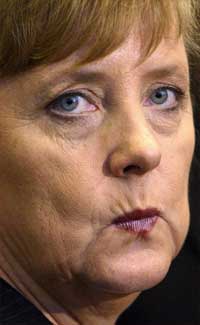German chancellor due in Siberia for talks
The question of Iran's nuclear ambitions and a looming United Nations Security Council deadline are expected to feature prominently in talks this week in the Siberian town of Tomsk between the leaders of Russia and Germany.

But as well as her ministers, German Chancellor Angela Merkel will be accompanied by scores of top business executives, a fact that underscores the burgeoning economic ties between the two countries.
Observers say Germany's dependence on Russian gas and a healthy trade turnover of nearly Ђ 40 billion (US$50 billion) last year has made Merkel's relationship with President Vladimir Putin less prickly than many had anticipated.
"Everyone expected something different on Merkel's policy toward Russia," said Richard Whitman, senior European fellow at the Chatham House thinktank in London.
"It was thought that there would a be a certain cooling. What is striking is that instead of looking for areas of disagreement Merkel is treading in the same footsteps as (former Chancellor Gerhard) Schroeder, in particular with respect to energy policy."
Schroeder's meetings with Putin were filled with backslapping bonhomie, and he drew criticism in Europe for accepting a US$300,000 ( Ђ 243,000) per-year job as chairman of a Russia-controlled gas pipeline project that he pushed while in office.
Meanwhile, expectations were high that Merkel would take a more sober view of Russia, in part as a result of her upbringing behind the Iron Curtain in communist East Germany. On her first visit in January she expressed concerns about the conflict in Chechnya and an apparent crackdown on non-governmental organizations, reports the AP.
I.L.
Subscribe to Pravda.Ru Telegram channel, Facebook, RSS!





